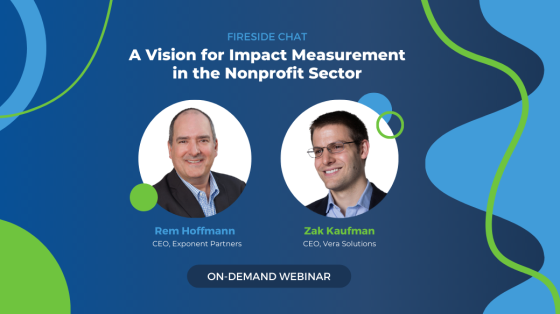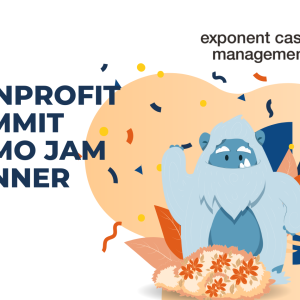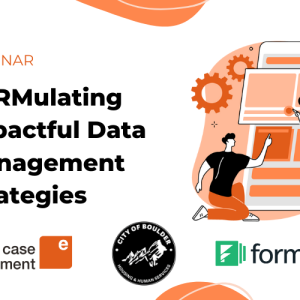The Future Of Impact Measurement
Rem Hoffmann, CEO of Exponent Partners, and Zak Kaufman, CEO of Vera Solutions, came together for a lively fireside chat discussion on June 22, 2022. Rem and Zak’s goal was to share their views of the present and future state of impact measurement in the nonprofit sector and talk about why Exponent Partners and Vera Solutions are working together. Moderated by Rachel Hands, Director of Success Center at Exponent Partners, the fireside chat touched on a number of important issues relating to social impact information systems, change management, what the future holds, and what organizations struggle with today. Let’s dive into some of the key takeaways from Rem and Zak’s chat.
Exponent Partners and Vera Solutions: An aligned, strategic partnership.
Rem and Zak shared how their organizations have partnered as a way to drive change in the nonprofit technology space and further their closely aligned missions. Both Exponent Partners and Vera Solutions are committed to driving social impact through their mission alignment, focus on collaboration and industry expertise. Rem shared, “We’re very similar organizations and also highly complementary. On one side, we have the same social venture DNA. We have a very similar social impact measurement focus in our respective missions, and interestingly we both build information systems products that bake best practices into software.” Curious to learn more? Check out Exponent Case Management and Amp Impact.
“Exponent Case Management is about managing programs, services, and everything that goes into the direct intervention that an organization applies. Whereas Amp Impact focuses on aggregate social impact across organizations for funders to gain insights into social impact. It’s both different and complementary.”
So, what does the future hold? Here is what Rem and Zak are excited about:
Rem shared that he’s most excited about the shift from individual technologies or tools to more centralized information systems. This is a big move in the right direction for organizations and allows them to create a sustainable method of generating value from their data. Rem likened it to enterprise performance management, essentially taking silos of data and turning it into information that will give you value by demonstrating your impact. Zak agreed with Rem and also shared his excitement about the people and momentum in the space. “The proliferation of talent in this space, the momentum around the data for social impact space as some call it I think is really tremendous.” Zak also shared details about a new report from data.org entitled ‘Workforce Wanted: Data Talent for Social Good’ that looks at the opportunity to shape and support a pool of data professionals focused on social impact over the next ten years. Check it out here.
What are the biggest opportunities for change?
Rem described a gulf between how nonprofit organizations collect data and then use that to tell stories about their social impact. Simply implementing a technology or tool isn’t enough to get you there. There is an additional challenge to get leaders and outcomes experts to look at data collection and impact measurement the same way and get true alignment in place. According to Rem, every organization should have an information systems strategy directly tied to their theory of change. This will allow for better decision-making with respect to bridging that gulf between data collection and true impact measurement. Zak highlighted that some organizations are shortcutting the data management part of the process, which undermines the sustainability of systems. A challenge here is often related to internal capacity and capabilities. Technology tools are broadly accessible, but capabilities and people can be the hard part for many nonprofits. Investing in capacity building in the nonprofit sector needs to be sustained in order to address this systemic challenge.
Interested to check out an on-demand recording of the full fireside chat discussion between Rem and Zak? Find it here.




